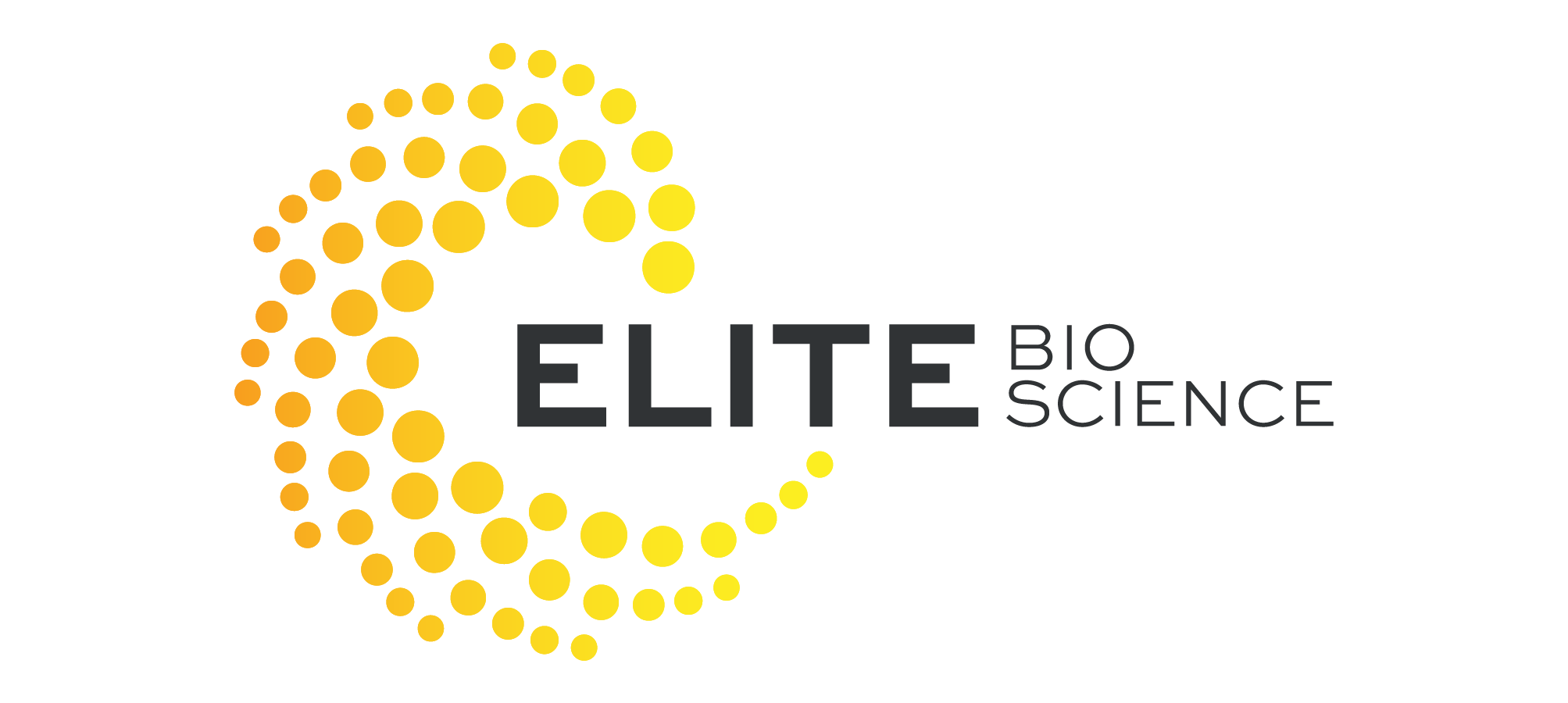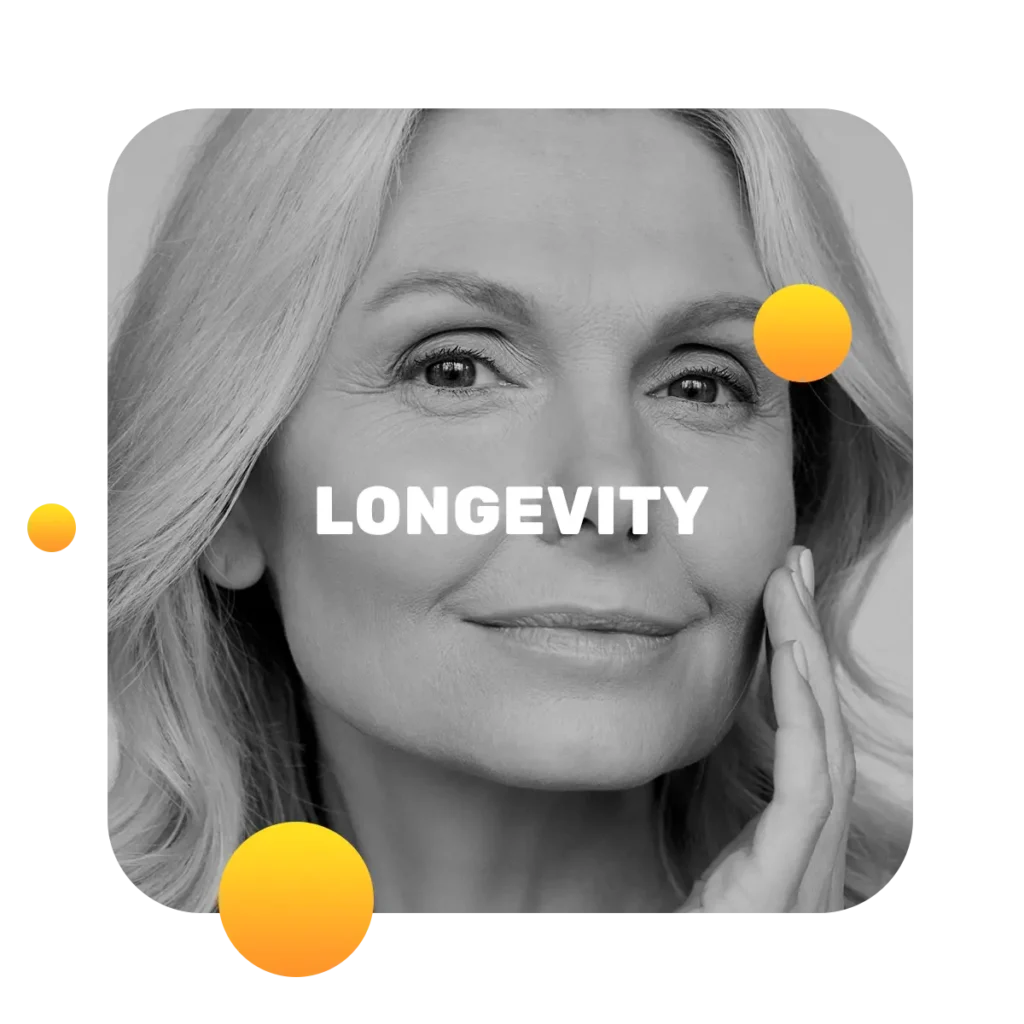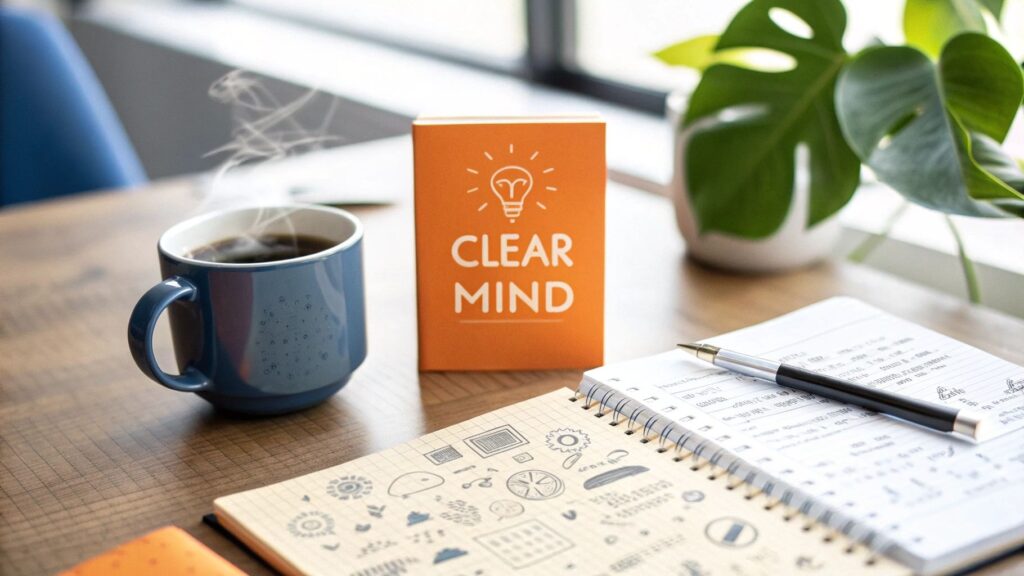If you're aiming to think clearer, the path forward isn't about some massive, life-altering overhaul. It's about starting with a simple framework built on three pillars: cognitive decluttering, strategic rest, and mindful nutrition. These fundamentals offer an immediate, actionable way to cut through mental fog.
Your Practical Guide to Mental Clarity
Feeling mentally scattered has become a default state for many of us, leaving us searching for a way to cut through the constant noise. The good news? Achieving real mental clarity isn’t about finding a magic bullet. It’s about building a solid foundation through small, consistent habits that deliver noticeable results in your day-to-day life.
This journey begins with a bit of honest self-assessment—figuring out your personal "clarity blockers" and then creating simple routines to push back against them. You don't need to reinvent your entire schedule. Instead, the goal is to weave powerful, mind-clearing techniques into the life you already have.
Think of it as a much-needed spring cleaning for your mind.
Pinpoint and Address Your Clarity Blockers
The first step is always awareness. You have to identify what’s actually causing the mental fog in the first place. For most people, it's a messy combination of information overload, a dozen unresolved tasks buzzing in the background, and straight-up decision fatigue.
A deceptively simple but powerful exercise to fight this is the "brain dump."
Just grab a piece of paper and for 10-15 minutes, write down absolutely everything on your mind. Worries, half-baked ideas, nagging to-do lists, frustrations—get it all out. This simple act of externalizing your thoughts can instantly lighten your cognitive load, making it far easier to see what actually deserves your attention. It's a foundational practice for anyone wondering how to think clearer.
Another go-to technique is the "5-minute focus" method. Set a timer for just five minutes and dedicate that sliver of time to a single task, with zero distractions. This short, intense burst of focus helps train your brain to resist the pull of multitasking, which is a notorious source of mental clutter.
The image below shows a simple but effective cycle for managing your thoughts once you've gotten them out of your head.
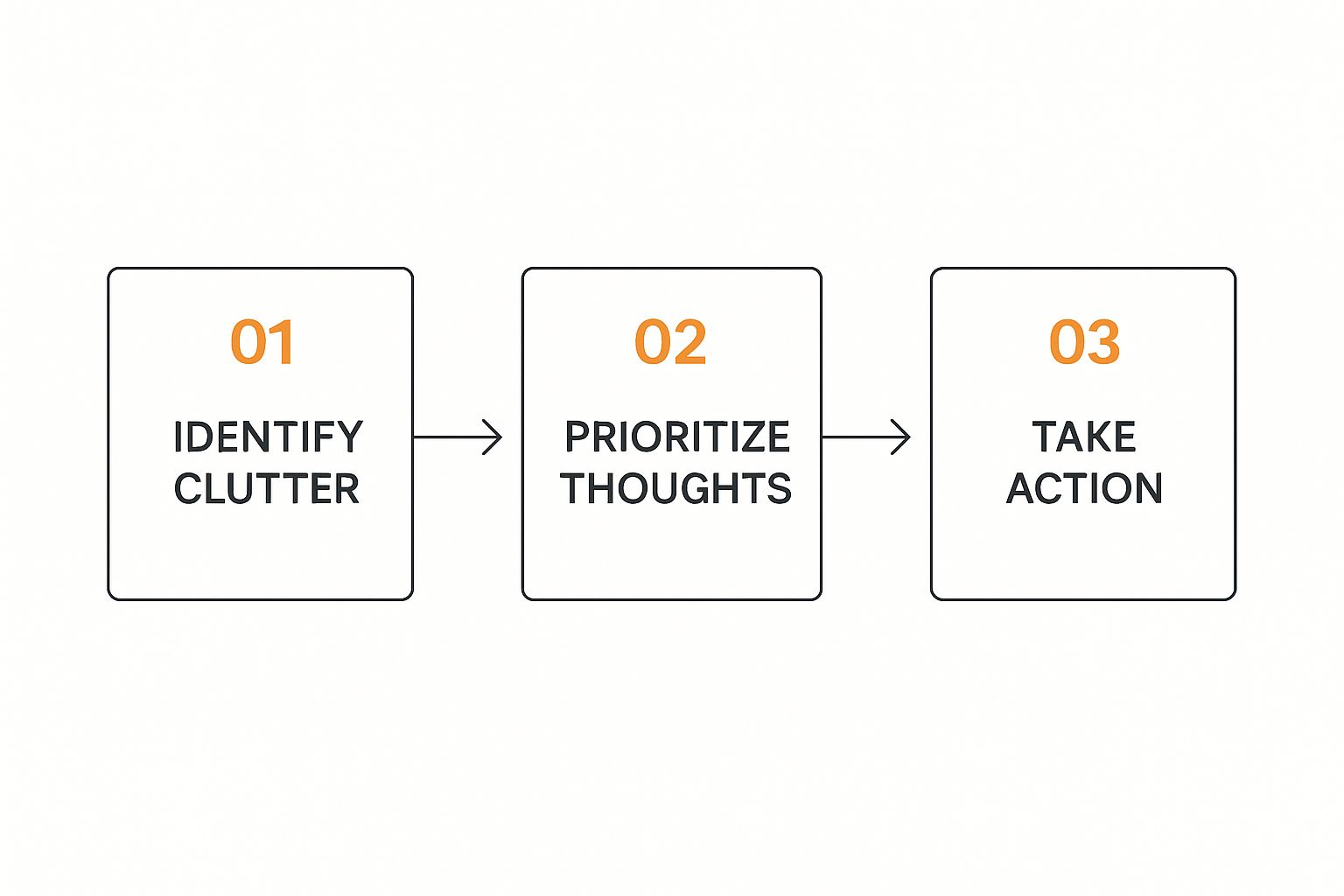
As you can see, clear thinking isn't a passive state. It’s an active process of identifying what's on your mind, prioritizing it, and then taking focused, decisive action.
To get you started on this path, here’s a quick-start framework that breaks down the foundational pillars of mental clarity into simple, actionable steps.
Quick-Start Framework for Clearer Thinking
| Pillar | Core Principle | Your First Actionable Step |
|---|---|---|
| Cognitive Decluttering | Reducing mental noise by externalizing thoughts and focusing on one task at a time. | Perform a 10-minute "brain dump" at the start of your day. Write down everything on your mind without judgment. |
| Strategic Rest | Using intentional breaks and quality sleep to recharge your cognitive resources. | Schedule two 15-minute screen-free breaks into your workday. Stand up, stretch, or look out a window. |
| Mindful Nutrition | Fueling your brain with nutrients that support focus and cognitive function. | Swap one sugary snack or drink for a brain-friendly alternative like a handful of nuts, berries, or dark chocolate. |
This table isn't meant to be an exhaustive list, but a starting point. By taking just one small action in each area, you can begin to build the momentum needed for lasting mental clarity.
The Growing Importance of Cognitive Training
This desire for a sharper, clearer mind isn't just a personal goal; it’s a reflection of a major global trend. The market for cognitive assessment and training is absolutely booming, valued at an estimated US$7.4 billion in 2024 and projected to skyrocket to US$31 billion by 2030.
This explosive growth is being driven by new technologies that make brain training more accessible and effective than ever before. You can discover more insights about this rapidly expanding market and its key drivers. It shows that we're collectively realizing that our mental fitness is just as important as our physical health.
Key Takeaway: True mental clarity isn't something you find; it's something you build. It’s an active skill, developed by consistently applying simple, targeted techniques to manage your mental environment, prioritize your focus, and take decisive action.
Cognitive Techniques for Sharper Thinking
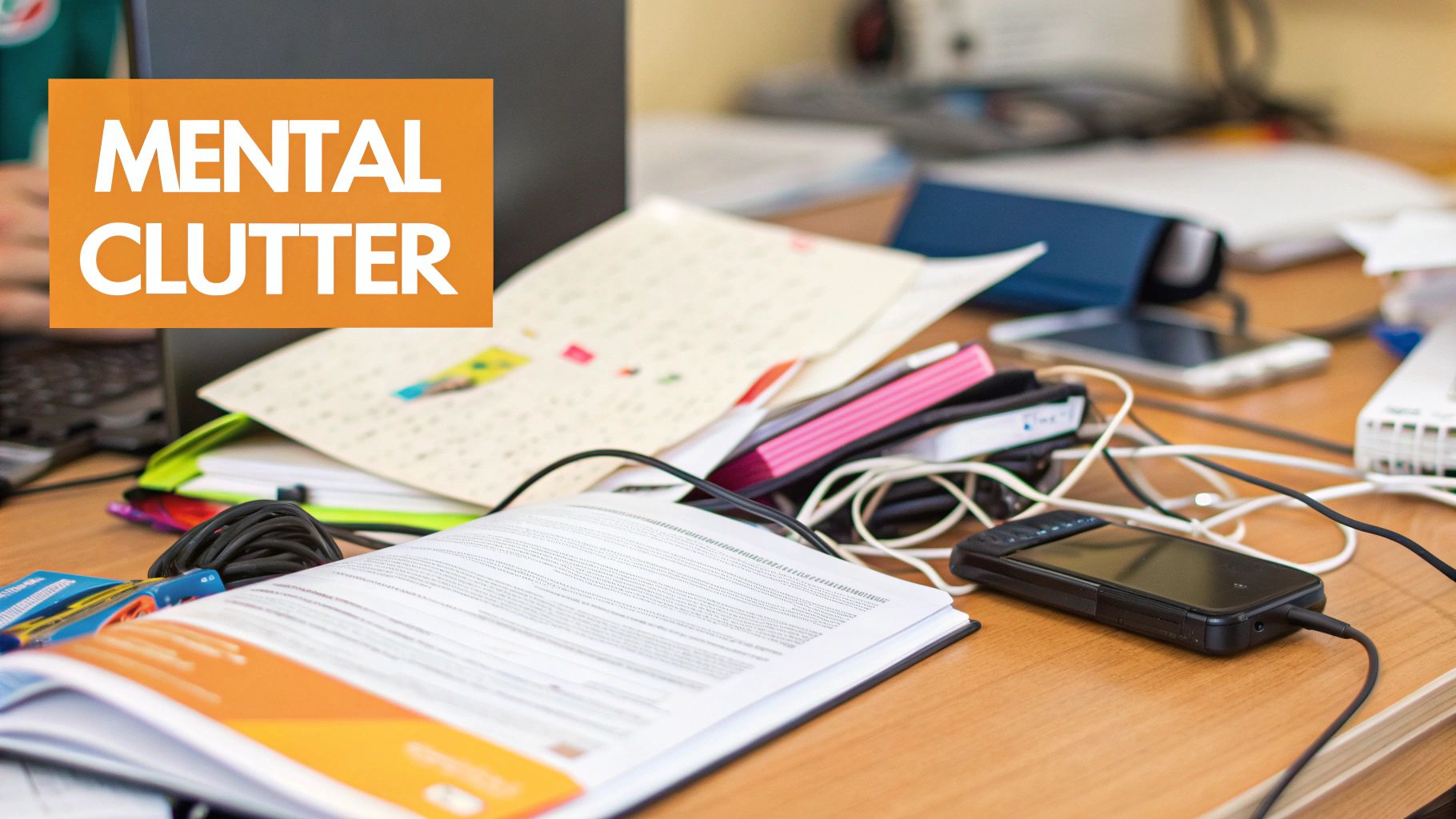
Thinking clearly isn't some passive state you just fall into; it's an active skill you can build. Just like an athlete runs drills to sharpen their physical performance, you can train your mind with specific cognitive exercises. These mental models are powerful tools for cutting through the noise and making better decisions.
They give you a structured framework to process information, challenge your own assumptions, and look at problems from completely new angles. Instead of getting caught in a frustrating loop of overthinking, you learn to navigate complexity with confidence. Let's dig into some of the most effective methods you can start using right away.
Master Second-Order Thinking
One of the most impactful ways to gain clarity is to practice second-order thinking. This just means looking past the immediate result of a decision to see the next-level, longer-term effects. First-order thinking is quick and easy—it solves the immediate problem right in front of you without considering what happens next.
For example, you might be tempted to jump at a new job offer because the salary is higher. That's a first-order consequence. But what about the second-order effects?
- A longer commute could steal time from family and exercise.
- A high-stress work environment could lead to burnout in a year.
- Fewer growth opportunities might stall your career in the long run.
By simply asking, "And then what?" you force yourself to see the entire chain reaction. This simple question transforms your decision-making from purely reactive to truly strategic, giving you profound mental clarity about the path you’re taking. It's a foundational skill for sidestepping future headaches.
Deconstruct Complexity with the Feynman Technique
Ever feel like a topic is just too dense to wrap your head around? The Feynman Technique is your answer. Named after the brilliant Nobel Prize-winning physicist Richard Feynman, this method is brutally effective at simplifying complex ideas and revealing the gaps in your own understanding.
Here’s the four-part breakdown:
- Pick a concept you want to master.
- Explain it to a child (or just pretend to) using simple, plain language.
- Find the gaps in your explanation where you get stuck or have to use jargon.
- Go back to the source material to fill those gaps, then simplify your explanation again.
Imagine you're trying to learn a new software program for work. Instead of just reading the manual, try explaining how it works to a friend who has zero context. You'll instantly discover where your own knowledge is fuzzy, forcing you to learn it on a deeper level until your explanation becomes crystal clear.
Key Takeaway: If you can't explain an idea simply, you don't really understand it. This technique is the ultimate acid test for your mental clarity on any subject.
Challenge Your Thoughts with Journaling
Your mind is a natural storyteller, but a lot of its stories aren't entirely true. Journaling is a practical way to pin these thoughts down and question their validity. This isn’t just about recapping your day; it’s about active inquiry to cultivate clearer thinking.
Try using guided prompts to kickstart your reflection:
- "What assumption am I making here that might not be true?"
- "What's another way I could look at this situation?"
- "If I set fear aside, what would I do?"
This process creates a bit of space between you and your thoughts, letting you observe them objectively instead of being swept away by them. Over time, this practice rewires your brain to question those automatic negative patterns and deliberately choose more productive viewpoints.
While these cognitive exercises are powerful, supporting your underlying brain health is also key. For those interested in a biological approach, learning about certain peptides for brain health can offer additional insights into cognitive support.
By consistently applying these techniques—looking at long-term consequences, simplifying complex ideas, and questioning your own narrative—you actively build the mental muscles needed for sharp, clear, and effective thinking.
Building the Lifestyle Foundation for a Clear Mind

While cognitive techniques are great for clearing your head in the moment, a truly sharp and resilient mind is built on the bedrock of your daily habits. Your mental state isn't some separate entity floating around in your skull; it's deeply intertwined with your physical health.
The way you eat, move, and sleep directly shapes your ability to think, focus, and solve problems. This isn't about some massive, intimidating life overhaul. It’s about making small, smart upgrades that create an environment where your brain can actually thrive. When your body is primed for peak performance, thinking clearly becomes less of a struggle and more of a default state.
Optimize Your Sleep for Cognitive Restoration
Sleep isn't just downtime. It's an active, critical maintenance period for your brain. While you're in deep sleep, your brain is busy clearing out metabolic junk that builds up during the day. This process is absolutely essential for cutting through the kind of mental fog that slows you down.
To get the most out of your sleep, it's not just about the hours you clock. It's about consistency. Try to go to bed and wake up around the same time every single day—yes, even on weekends. This helps stabilize your circadian rhythm, making it much easier to fall asleep and wake up feeling genuinely refreshed.
Key Insight: A consistent sleep schedule is more powerful than just getting eight hours. It trains your brain for efficient cognitive restoration, which is fundamental to how you think clearer day after day.
Create a "wind-down" routine for the hour before you plan to sleep. This means putting away the screens, which blast your eyes with blue light that messes with your melatonin production. Instead, pick up a physical book, do some light stretching, or listen to calm music. This is your signal to your brain that it's time to power down, making the transition to sleep smoother and your rest more restorative.
Fuel Your Brain with Smart Nutrition
The food you eat is quite literally the fuel your brain runs on. And while any balanced diet is a good start, some nutrients are absolute superstars when it comes to supporting brain function and fighting off cognitive decline.
Omega-3 Fatty Acids: These are vital for building and maintaining the very structure of your brain cells. A diet rich in omega-3s can boost memory and overall cognitive horsepower. A simple lunch of grilled salmon over a bed of spinach with a sprinkle of walnuts is a perfect example.
Antioxidants: Found in foods like berries, dark chocolate, and leafy greens, antioxidants fight off oxidative stress. Think of this as cellular rust that can damage brain cells and speed up cognitive aging. A bowl of mixed berries with a handful of almonds makes for a brain-boosting snack.
These choices have real long-term consequences. As we get older, keeping our minds sharp is a top priority. Mild Cognitive Impairment (MCI), a condition that directly affects clear thinking, impacts roughly 23.7% of the global elderly population. Things like lifestyle and what we eat play a huge role in this. You can read the full research about MCI and its risk factors to get a deeper understanding of why these daily habits matter so much.
Exercise to Boost Your Brainpower
Physical activity is one of the most powerful brain boosters available. Period. Exercise gets more blood flowing to your brain, delivering a fresh supply of oxygen and nutrients. It also triggers the release of brain-derived neurotrophic factor (BDNF), a protein that acts like fertilizer for your brain cells, helping them grow and form stronger connections.
Different kinds of exercise offer unique perks:
- Aerobic Exercise: Think brisk walking, running, or cycling. This is fantastic for boosting BDNF and improving executive functions like planning and focus.
- Strength Training: Lifting weights has been shown to improve memory and protect the brain from age-related wear and tear.
- Mind-Body Practices: Yoga and Tai Chi are excellent for reducing stress and sharpening your attention by blending physical movement with mindfulness.
Even a quick, 20-minute walk during your lunch break can significantly improve your ability to think more clearly for the rest of the afternoon. When these foundational habits—sleep, nutrition, and exercise—are in place, managing your weight and energy levels becomes much easier, which further supports a clear mind.
For those looking into a comprehensive approach to wellness, understanding how specific therapies can support these goals is helpful. You might be interested in our guide on peptides for weight loss, which can complement a healthy lifestyle. The real key, though, is to find a form of movement you actually enjoy and make it a non-negotiable part of your weekly routine.
Weaving Clarity Habits Into Your Daily Routine

Lasting mental clarity doesn’t show up after a single weekend retreat or one big effort. It’s built, piece by piece, from the small, consistent actions you weave into the fabric of your daily life. The real goal is to make these practices feel less like chores and more like automatic behaviors that keep you sharp.
It all starts with a simple truth about how we work: we build new habits by linking them to old ones. By tapping into the fundamentals of habit formation, you can seamlessly add these powerful practices to your existing schedule, creating a sustainable system for clearer thinking.
Build Momentum with Habit Stacking
The easiest way to get a new habit to stick is to attach it to something you already do without thinking. This genius little trick is called habit stacking. Instead of trying to carve out brand-new time for a clarity exercise, you just piggyback it onto an established routine. It completely removes the friction of starting from zero.
Here’s what this looks like in the real world:
- After I pour my morning coffee, I will do a five-minute brain dump in my journal.
- Before I open my email for the first time, I will identify my single most important task for the day.
- After I put my lunch plate in the dishwasher, I will take a five-minute walk outside.
This method is so effective because the existing habit—making coffee, opening email—acts as a powerful, built-in trigger for the new one. The connection becomes automatic, demanding way less willpower than trying to remember some new, isolated task. It's a simple but profound way to make daily progress toward thinking more clearly.
Redesign Your Environment for Automatic Focus
Your physical and digital spaces have a massive, often invisible, impact on your mental state. A cluttered desk or a phone buzzing with notifications creates a constant, low-grade hum of distraction that splinters your focus. When you consciously design your environment, you make clear thinking the path of least resistance.
Start with your physical workspace. If you can, create a dedicated, distraction-free zone used only for deep work. Clear off anything that isn’t essential for the task at hand. The less visual noise your brain has to process, the more cognitive fuel it has for focused thought.
Pro Tip: Create "digital zones" on your devices. I use one web browser profile strictly for work—minimal bookmarks, no social media logins. I have a completely separate profile for personal stuff. This creates a psychological boundary that helps my brain snap into focus mode the moment I open that "work" browser.
Next, get ruthless with your digital environment. Turn off all non-essential notifications on your phone and computer. Research has shown that a single notification can completely derail your train of thought, and it can take over 20 minutes to fully get back on track.
By taking back control from these external pings and dings, you create the quiet mental space needed for deep, clear thinking. Start small, and build from there.
Troubleshooting Common Barriers to Clear Thinking
Even when you’ve built a solid routine, life has a way of throwing curveballs that test your mental clarity. Stress, a constant barrage of information, and emotional fatigue are the usual suspects. They're saboteurs that can cloud your judgment and drain your cognitive energy before you even realize it.
This is where building resilience really counts. It's about having a toolkit ready to fight back the moment that mental fog starts rolling in.
When stress hits hard, your body kicks into fight-or-flight mode, which is terrible for rational, clear-headed thinking. One of the most powerful ways to regain control in seconds is a technique called the physiological sigh. It's simple: take two sharp inhales through your nose, one right after the other, and then a long, slow exhale through your mouth. This isn't just a deep breath; it's a neuroscience-backed method that rapidly calms your nervous system.
Another fantastic tool is box breathing. Inhale for four seconds, hold your breath for four, exhale for four, and hold again for four. Just a few cycles of this can lower your heart rate and bring an immediate sense of calm, making it much easier to think straight when the pressure is on.
Taming Information Overload and Emotional Fog
In our hyper-connected world, information overload is a battle we fight every single day. The best defense is to curate what you let in with a strict "information diet." Just like you'd choose healthy food, be intentional about the news, social media, and other content you consume.
A little digital house-cleaning goes a long way. Unsubscribe from junk email, unfollow accounts that drain you, and shut off non-essential notifications. This one move can reclaim a surprising amount of mental bandwidth.
Emotional fatigue can be just as draining as a flood of information. When you feel an emotion starting to take over, try practicing detached observation. Instead of thinking, "I am angry," reframe it as, "I am experiencing the feeling of anger." This small shift in language creates a bit of mental space, letting you observe the emotion without letting it hijack your thoughts.
When your mind feels clouded, the goal isn't to force clarity but to gently remove the obstacles preventing it. Breathing exercises address the physiological noise, while an information diet and emotional labeling tackle the mental and emotional clutter.
These troubleshooting techniques are not just quick fixes; they are essential for long-term cognitive health. As we get older, the challenges to clear thinking can become more pronounced. Conditions like dementia and Alzheimer's disease represent some of the most significant hurdles worldwide.
In 2020, over 55 million people were living with Alzheimer's, and that number is projected to soar to nearly 139 million by 2050. These sobering statistics underscore just how critical it is to be proactive about brain health throughout our lives. You can discover more insights about these global cognitive health projections and the contributing factors.
Hormonal balance also plays a huge part in our cognitive function and ability to manage stress. If you're looking at every angle to optimize your mental performance, you might find our guide on how to increase testosterone naturally interesting, as it ties directly into overall vitality and mental sharpness.
By building a personal toolkit of these strategies, you’re better equipped to navigate life's inevitable stressors and maintain your edge, no matter what comes your way.
Your Questions About Mental Clarity, Answered
As you start putting these ideas into practice, you’re bound to have questions. That’s a good thing. Getting clear on the practical side of this journey will give you the confidence to see it through. Let’s tackle some of the most common questions people ask when they decide to sharpen their thinking.
How Long Does It Really Take to See Results?
This is always the first question, and the honest answer is: it depends.
You can feel a sense of immediate relief from a technique like a "brain dump." Seriously, in less than 15 minutes, you can take a jumbled mess of thoughts and organize them on paper, clearing your head almost instantly.
But building deep, lasting mental clarity is a different ballgame. For habits like better nutrition or consistent sleep, think in terms of weeks and months, not days. You'll likely notice small shifts in the first few weeks—maybe you feel a bit less reactive in meetings or more locked in on a single task. For the kind of automatic, background clarity that becomes your new normal, give it at least one to three months of steady effort.
Key Insight: Forget the timeline and focus on consistency. Small, daily actions create momentum. The results will come, not as a sudden event, but as a gradual and welcome new reality.
Can You Improve Cognitive Skills at Any Age?
Absolutely. There's a powerful concept in neuroscience called neuroplasticity—and it's not just for kids. It's your brain's incredible ability to rewire itself by forming new connections, and this capacity sticks with you for life.
Sure, learning a new language might feel a little faster when you're 18, but your brain never loses its adaptability. Every time you tackle a new puzzle, practice a mindfulness exercise, or even just take a brisk walk, you're encouraging your brain to build new pathways.
It is never too late to train your brain to be sharper and more resilient. Whether you’re 25 or 65, you have the power to make real, meaningful improvements in how you think and feel.
What Is the Single Most Important Habit?
If I had to bet on one single habit to improve mental clarity, my money would be on consistent, high-quality sleep. Every single time.
Sleep is the non-negotiable foundation for everything else. It’s when your brain gets to work consolidating memories, clearing out metabolic junk that builds up during the day, and resetting its emotional circuits.
Think of it this way: without enough good sleep, every other effort you make—from eating a healthy diet to practicing cognitive exercises—is like trying to build a house on sand. You can do everything else right, but the foundation just isn't there to support it.
Making sleep your number one priority is the ultimate force multiplier for a clearer, sharper mind. It’s the best investment you can possibly make.
At Elite Bioscience, we believe that optimizing your body's internal environment is a key part of achieving peak mental and physical performance. Our expert-led therapies are designed to support your journey toward enhanced cognitive function and overall vitality. Explore how our tailored treatments can complement your efforts to build a clearer, more focused mind. Learn more at Elite Bioscience.
